
"Rosalita (Come Out Tonight)" is a 1973 song by Bruce Springsteen, from his The Wild, the Innocent & the E Street Shuffle album, and is especially famed as a concert number for Springsteen and The E Street Band. The song, which clocks in at just over seven minutes, is a story of forbidden love between the singer and the titular Rosalita, whose parents disapprove of his life in a rock and roll band. It is included on the compilation albums The Essential Bruce Springsteen and Bruce Springsteen & The E Street Band Greatest Hits. In 2021, Rolling Stone ranked it the 446th greatest song of all time on their updated 500 Greatest Songs of All Time list.

Lola Versus Powerman and the Moneygoround, Part One, commonly abbreviated to Lola Versus Powerman, or simply Lola, is the eighth studio album by the English rock band the Kinks, released on 27 November 1970. A concept album, it is a satirical appraisal of the music industry, including song publishers, unions, the press, accountants, business managers, and life on the road. Musically Lola Versus Powerman is varied, described by Stephen Thomas Erlewine as "a wildly unfocused but nonetheless dazzling tour de force", containing some of Ray Davies's strongest songs.

Modern Sounds in Country and Western Music is a studio album by American singer and pianist Ray Charles. It was recorded in February 1962 at Capitol Studios in New York City and United Western Recorders in Hollywood, and released in April of that year by ABC-Paramount Records.

"Lola" is a song by the English rock band the Kinks, written by frontman Ray Davies for their 1970 album Lola Versus Powerman and the Moneygoround, Part One. The song details a romantic encounter between a young man and a possible cross-dresser or trans woman, whom he meets in a club in Soho, London. In the song, the narrator describes his confusion towards Lola, who "walked like a woman but talked like a man", yet he remains infatuated with her.
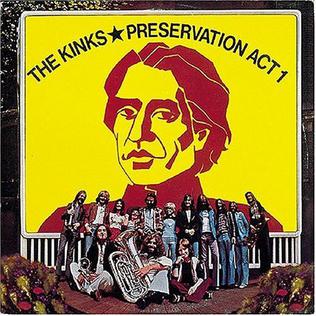
Preservation Act 1 is a concept album and the 12th studio album by the English rock group the Kinks, released 16 November 1973 by RCA Records.

Low Budget is the eighteenth studio album by English rock group the Kinks, released in 1979. Following the minor success of their 1978 album Misfits, the band recorded the majority of the album in New York rather than London. Unlike the more nostalgic themes of many Kinks albums prior to Low Budget, many of the album's songs allude to contemporaneous events. Musically, the album is a continuation of the band's "arena rock" phase, resulting in a more rock-based sound and more modern production techniques.

Misfits is the seventeenth studio album by the English rock band the Kinks, released in 1978. Following the minor success of Sleepwalker in the United States, Misfits featured a more rock-oriented style than many other Kinks records of the 1970s. Despite internal conflicts within the band, leading to both bassist Andy Pyle and pianist John Gosling quitting the band, the album made the Top 40 in America. The album also contained the minor hit single "A Rock 'n' Roll Fantasy", as well as less successful releases "Live Life" and "Black Messiah".
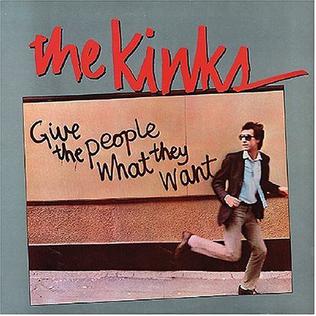
Give the People What They Want is the nineteenth studio album by the English rock group the Kinks. It was released in August 1981 in the US but not until January 1982 in Europe. It was delayed because lead singer Ray Davies wanted to produce a full-length video for the album but financing fell through. Also scrapped were plans to remix the album for the European market. It was initially aimed to be a statement on the media.
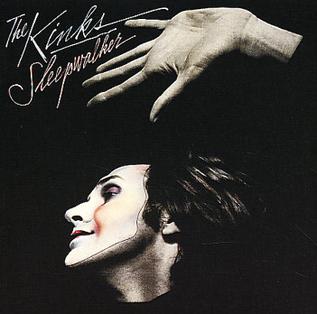
Sleepwalker is the sixteenth studio album by the English rock group, the Kinks, released in 1977. It marked a return to straight-ahead, self-contained rock songs after several years of concept albums. It is the first album in what critics usually call the "arena rock" phase of the group, in which more commercial and mainstream production techniques would be employed. The album also marks the last appearance of bassist John Dalton, who left the band during the recording sessions. Dalton plays bass on all songs on the album save for "Mr. Big Man". The lineup of the Kinks would be trimmed down significantly in 1977 following the album's release, as the brass section and backup singers were removed and the band returned to a standard rock band outfit.

Black Messiah is the third studio album by American singer, songwriter, and multi-instrumentalist D'Angelo, credited to D'Angelo and the Vanguard. It was released on December 15, 2014, through RCA Records, more than a decade after his previous solo release Voodoo. The album was produced and mostly written by D'Angelo, who collaborated with musicians including percussionist Questlove, bassist Pino Palladino, guitarist Isaiah Sharkey, and horn player Roy Hargrove. He pursued an entirely analog and murky funk sound for the record, lending it comparisons to the 1971 Sly & the Family Stone album There's a Riot Goin' On.

Preservation Act 2 is a 1974 concept album by the English rock band the Kinks, and their thirteenth studio album. It sold poorly, and received a mixed response among critics. Ken Emerson, in Rolling Stone, held out the album as an "underrated" one in the Kinks' repertoire.
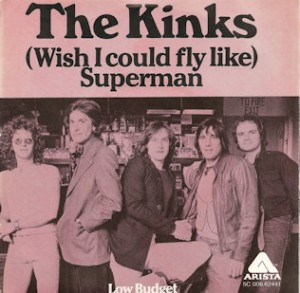
"(Wish I Could Fly Like) Superman" is a song written by Ray Davies that was first released on the Kinks' 1979 album, Low Budget. The song, inspired by Superman: The Movie, employs a disco beat and lyrics that describe the singer's wish to be like the fictional character Superman. The song's disco style was created as a response to Arista Records founder Clive Davis's request for "a club-friendly record," despite Ray Davies' hatred of disco.

"Catch Me Now I'm Falling" is a song written by Ray Davies and first released by The Kinks as the second track on their 1979 album Low Budget. Written as a criticism of America's allies, the song depicts the fall of Captain America as a symbol of the United States' dire circumstances at the time. The song features multiple solos on different instruments as well as a riff similar to "Jumpin' Jack Flash".

"State of Confusion" is a song written by Ray Davies and first released by The Kinks as the title track of their 1983 album State of Confusion. Although it was not released as a single in the United States, it reached #26 on Billboard's Hot Mainstream Rock Tracks chart. It was released as a single in Continental Europe.

"Muswell Hillbilly" is a track recorded by British rock band The Kinks. It served as the title track to their 1971 album, Muswell Hillbillies.

"Moving Pictures" is the final track on The Kinks' 1979 album Low Budget. Like the other ten tracks on the album, it was written by Ray Davies.
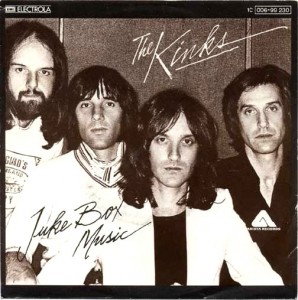
"Juke Box Music" is a track from The Kinks' 1977 album, Sleepwalker. It was one of the first tracks recorded in The Kinks' Konk recording complex. The song was also performed for The Old Grey Whistle Test in 1977.

"A Rock 'n' Roll Fantasy" is the lead single and fourth track from The Kinks' 1978 album Misfits. Written by Ray Davies, the song was inspired by the band's then-tumultuous state at the time, with two members leaving the band during the recording of Misfits. Released as the first single from the album, the track was the band's most successful single in years, reaching number 30.
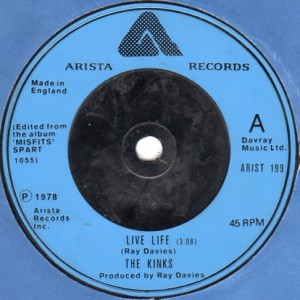
"Live Life" is a track from The Kinks' 1978 album, Misfits. The track was written by The Kinks' primary songwriter, Ray Davies.

"Misfits" is the title track for The Kinks' 1978 album, Misfits. It was written by Ray Davies.




















